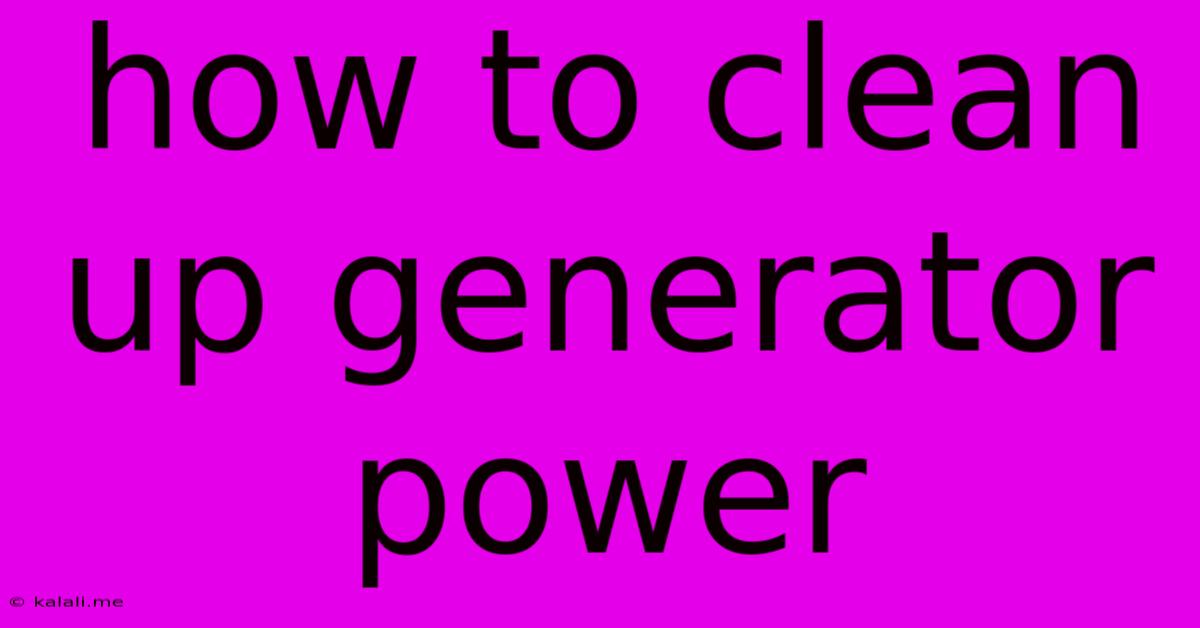How To Clean Up Generator Power
Kalali
May 28, 2025 · 3 min read

Table of Contents
How to Clean Up Generator Power: Ensuring Safe and Reliable Electricity
Meta Description: Learn how to clean up generator power for safer, more reliable electricity. This guide covers troubleshooting common issues, improving power quality, and maintaining your generator for optimal performance. We'll cover everything from grounding to surge protection.
Generators provide a crucial backup power source during outages, but the power they produce isn't always as clean as power from the grid. Dirty generator power can damage sensitive electronics, and understanding how to improve it is vital. This article will guide you through the steps to clean up generator power, focusing on safety and reliability.
Understanding Dirty Generator Power
"Dirty" generator power refers to inconsistencies and impurities in the electrical signal produced by a generator. This can manifest in several ways, including:
- Voltage fluctuations: The voltage may be too high or too low, causing damage to appliances and electronics.
- Harmonic distortion: The waveform of the power isn't a pure sine wave, leading to inefficient operation and potential harm to equipment.
- Transient surges: Sudden spikes in voltage can fry delicate components.
- Noise: Electrical noise can interfere with sensitive equipment like computers and audio systems.
Steps to Clean Up Generator Power
Cleaning up generator power involves a multi-pronged approach focusing on proper setup, maintenance, and the use of power conditioning equipment.
1. Proper Grounding
Proper grounding is paramount. A good ground connection protects against electrical shocks and helps stabilize the voltage. Ensure your generator is properly grounded according to the manufacturer's instructions. Use a dedicated grounding rod and check the connection regularly. Poor grounding is a major contributor to dirty power.
2. Regular Maintenance
Preventative maintenance is key. Regularly inspect and clean your generator, ensuring all connections are tight and free of corrosion. Change the oil and air filter as recommended by the manufacturer. A well-maintained generator is more likely to produce cleaner power. Consider professional servicing periodically.
3. Using a Power Conditioner
A power conditioner is a device that filters out impurities and stabilizes the voltage from your generator. These conditioners come in various types, including:
- Surge protectors: These protect against voltage spikes.
- Voltage regulators: These maintain a consistent voltage output, regardless of fluctuations from the generator.
- Uninterruptible Power Supplies (UPS): These provide backup power and often include voltage regulation and surge protection.
Choosing the right power conditioner depends on your specific needs and the sensitivity of your equipment. Consult with an electrician or power specialist for recommendations.
4. Load Management
Avoid overloading your generator. Overloading can cause voltage fluctuations and other problems. Know the maximum output of your generator and don't exceed it. Prioritize essential appliances and avoid running too many high-power devices simultaneously. Proper load management significantly improves power quality.
5. Choosing the Right Generator
Investing in a higher-quality generator with advanced features like automatic voltage regulation (AVR) can significantly reduce the likelihood of dirty power. Generators with AVR systems actively regulate the output voltage, maintaining a consistent and clean power supply.
6. Professional Installation and Inspection
For critical applications or large generators, professional installation and regular inspections are highly recommended. A qualified electrician can ensure proper grounding, wiring, and load balancing, minimizing the risk of dirty power and ensuring safety.
Conclusion: Prioritize Clean Power
While generators provide valuable backup power, the quality of that power is crucial. By following these steps, you can significantly improve the cleanliness and reliability of your generator's output, protecting your equipment and ensuring safe operation. Remember, preventative maintenance and proper setup are your best defenses against dirty power. Investing in appropriate power conditioning equipment further enhances the quality and safety of your backup power supply.
Latest Posts
Latest Posts
-
How Do You Restart A Canon Powershot Camera
May 30, 2025
-
Can I Check Out Of A Hotel Early
May 30, 2025
-
Convert State Plane Coordinates To Latitude And Longitude
May 30, 2025
-
We Are Defently Are Going To Get Along
May 30, 2025
-
3 Way Motion Sensor Switch Wiring Diagram
May 30, 2025
Related Post
Thank you for visiting our website which covers about How To Clean Up Generator Power . We hope the information provided has been useful to you. Feel free to contact us if you have any questions or need further assistance. See you next time and don't miss to bookmark.